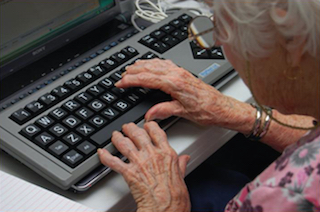
Half of older adults don’t use web portals designed to let them communicate with their healthcare providers, and even those who do use them are not taking advantage of all of the portal’s features, according to a new study.
This finding suggests a concern for healthcare providers who offer such portals in part to obtain Medicare incentives, according to the researchers.
Investigators at the University of Michigan Institute for Healthcare Policy and Innovation polled 2,013 people aged 50 to 80 and found that those with more education and higher household incomes were more likely to use patient portals. People aged more than 65 years, however, were more likely than those in their 50s and early 60s to say they don’t like using the computer to communicate about their health — or to say they’re not comfortable with technology in general, according to poll results.
Among older adults who said they had not set up access to a patient portal, reasons included:
- Concerns about communicating online about health information, 52%
- No perceived need for this kind of access to their health information, 50%
- They just hadn’t gotten around to setting up their access yet, 40% (these respondents tended to be adults in their 50s and early 60s, according to researchers)
- “Very concerned” that online communication would bring a higher chance of error than talking with someone on the phone or in person would, 27%
- “Very concerned” they would not know who from the provider’s staff was answering their question, 19%
- “Very concerned” that getting a response to an online communication would take too long, 17%
“Many older adults still prefer telephone contact with their providers,” said poll director and U-M Medical School Professor Preeti Malani, M.D., noting that 47% of poll respondents said calling was a better way to explain their request.
Among those who had signed up for a portal, however, respondents were almost evenly divided between those who said using the phone was a faster way to get an answer, those who said the portal was faster and those who said they were the same.
Among older adults who had set up portal access:
- 84% said had viewed their results from blood tests or other tests.
- 43% had refilled a prescription online.
- 37% had used a portal to schedule an appointment.
- 26% had obtained advice about a health problem from the provider online.
Of those who have portal accounts, 43% said they had authorized someone else to log in to see their information — mostly spouses and partners but also adult children and other family members, some of whom may be their caregivers, the researchers said.
Among those who hadn’t authorized another user, 22% said they didn’t know how to set up this capability, and 35% said they preferred to keep their information private. The other 43% said nobody else helps with their care.



